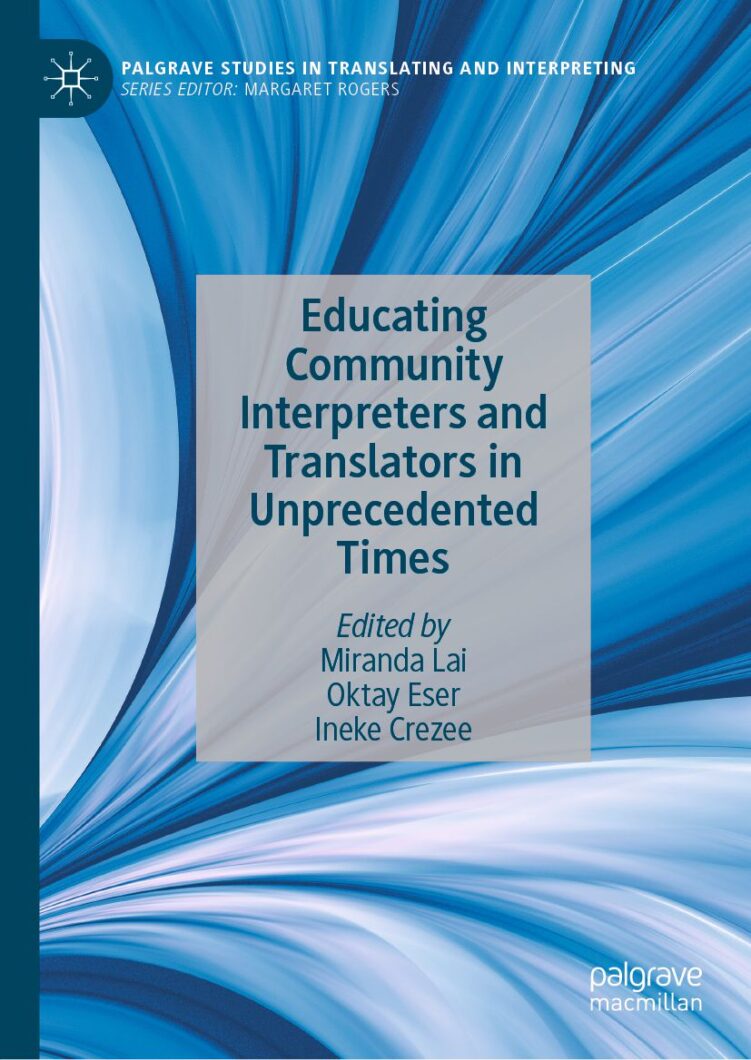BOOK REVIEW
edited by Miranda Lai, Oktay Eser and Ineke Crezee
reviewed by Dr Ron Witton
‘Miranda Lai reminds us of the pioneering role played by Australia in this area …’
There are 17 chapters in this very comprehensive survey of how the interpreting and translating world has been transformed by COVID, and the progress being made around the world towards having our profession recognised as vital to civil, legal, economic and social life.
The significant role being played by Australia is shown by not only the choice of RMIT University’s Miranda Lai as senior editor, but also the well-researched chapter ‘Australia: Navigating the Pandemic and Exploring New Pedagogical Horizons’, by Miranda’s colleagues Erika González García, Caroline Norma and Olga García-Caro. All four Australian contributors have drawn on their wide experience of T&I in Australia, and much that is discussed here will be both familiar and of great interest to the readers of In Touch. However, the strength of the chapter lies in how it helps us see the wider picture of both the industry and the society in which we ply our trade.
For those of us who maintain an interest in what is happening in our clients’ countries of origin, there are chapters on Argentina and Uruguay, Belgium, Canada, China, New Zealand, Palestine, South Africa, South Korea, Spain, Turkey, Ukraine and the USA, as well as other chapters focusing specifically on technology and government responses to our ever-changing society, including in this post-COVID era.
Of particular interest are Miranda Lai’s introductory and concluding chapters. Her introductory ‘Community Translation and Interpreting in Unprecedented Times’ sets the scene: how COVID impacted both the world and the T&I profession. As in most professions, both training and practice had to rely on the use of remote technology to ensure a supply of T/Is during the worldwide surge in the demand for communicators, who were needed to assist governments and institutions in addressing the plight of often isolated individuals.
The particular role of community T&I is addressed, as is its increasingly important role given the sharp rise in immigration worldwide, and close attention is paid to the maintenance of standards in this situation, and the central role played by credentialling.
Miranda reminds us of the pioneering role Australia played in this area, as the first country to set up a comprehensive credentialling system for community T/Is through the establishment of NAATI in 1977, and also rightly highlights the role AUSIT played in creating a professional organisation for practitioners which is, in many ways, a model for the world.
She then draws on the individual chapters to provide a global comparative analysis, the comprehensiveness of which results from having access to the analysis and experience of the 29(!) authors who have cooperated in producing this book.
Miranda’s final chapter, ‘Community Interpreting and Translation: Looking to the Future’, draws on the wealth of information contained in the preceding 16 chapters to predict future developments in T&I. She addresses many of the problems still being faced in this (almost) post-COVID world, including ‘Zoom fatigue’ and the blurring of work boundaries, and their impact on our day-to-day workload. She stresses how our digital literacy has been challenged, and also the manner in which technology has challenged integrity in testing and performance measurement.

Cover reproduced courtesy of Palgrave Macmillan
However, her assessment of our current world is not all doom and gloom – she sees a silver lining in areas such as flexibility and autonomy of learning, and the professional and individual benefits of tapping into expanded virtual networks.
This volume will do much to stimulate thought on the road ahead for individuals, institutions, and governments in maintaining T&I standards, and in promoting innovation in the coming years, and it rightly recognises Australia’s significant role in this.

Dr Ron Witton gained his BA and MA in Indonesian and Malayan Studies from the University of Sydney and his PhD from Cornell University, USA. He is a foundation member of AUSIT, and currently practises as an Indonesian– and Malay–English translator and interpreter.


